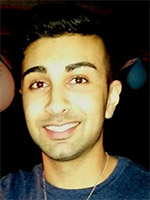
Every year, Psi Chi International gives out 24 grants of $5000 to fund undergraduate student research in the summer. This year, Psi Chi member Manesh Girn won a Psi Chi Summer Research Grant to conduct research here at UBC. UBC’s Psi Chi executives sat down with Manesh to learn more about his experiences through the grant.
Who are your supervisors for this grant?
My project involves a collaboration between two Cognitive Neuroscience labs in the Psychology department. I have two supervisors: Dr. Kalina Christoff and Dr. Lawrence Ward.
What made you want to apply for this grant?
As a newly admitted member of Psi Chi, one of the first things I did was scroll through potential scholarships and grants. I was already planning on running a research project, and wanted to try to find a way to fund myself. This grant has allowed me to really immerse myself in a research environment and engage with what I’m doing.
Through this grant, what research are you doing?
I am running an EEG (electroencephalogram) study which seeks to characterize the dynamics of brain activity surrounding spontaneously arising thoughts during meditation. In the primary condition, we are having individuals meditate while hooked up to an EEG [machine] (which measures brain electrical activity), and asking them to indicate via button press when a spontaneous distracting thought arises. We are then analyzing the brain activity immediately prior to, during, and after the button press.
What is your long-term goal, research or otherwise?
I plan on going to graduate school immediately after my undergrad, in order to pursue a PhD in Cognitive Neuroscience. I am fascinated by questions pertaining to how dynamic interactions within the brain contribute to our experience and cognition of the world, specifically in relation to areas such as meditation, mind-wandering, and psychedelic experience. This area is my passion, and I plan on pursuing a lifelong career in research, working as a professor and researcher.
How are your research experiences this summer contributing to this goal?
[My research experiences] have allowed me to get a much deeper idea of what really constitutes the research process and what it requires. [My experiences have] also given me invaluable firsthand experience with running participants, collecting and analyzing data, and the process of writing a manuscript for publication. These are all certainly going to bolster my CV and my chances [of] getting into a top graduate school.
What advice do you have for students who are interested in applying for this award?
Find a supervisor doing work that is aligned with your interests, and take the initiative to contact them in a confident manner – and make sure to do your homework beforehand, so that you come off as a knowledgeable, enthusiastic, and highly functioning student. Also, for the application, make sure you get exceptional references from profs who know you well, and do your best to come off as a serious and educated researcher.
Which of these courses have you taken: PSYC 217, 218, 359, and/or 366? How has taking these courses prepared you to conduct real research?
I’ve taken PSYC 217 and 218. I think these both provide great basic background for what is necessary for conducting research in the behavioral sciences. In particular, they’re very useful for gaining a critical eye on what constitutes good research, and how to approach methodological concerns. I would think these courses are most useful for behavioral experiments, whereas cognitive neuroscience methodologies such as EEG or fMRI require a totally new set of statistical techniques and often use relatively different experimental paradigms.
How have you shared (or do you intend on sharing) your research with others? (e.g., publications, conferences, etc.)
I have sent an abstract of my project to the 2016 Society for Neuroscience conference, and will be presenting a poster there this November in San Diego. I also intend to publish my findings in a scientific journal.
This year, UBC’s Psi Chi chapter wants to help connect students with possible mentorship opportunities. If you’re a student and you have questions about Manesh’s experiences with the Psi Chi Summer Research Grant, please email us at psichi@psych.ubc.ca. We can put you in contact with Manesh.
For more information about Psi Chi International’s summer research grants, and what UBC Faculty may be eligible to sponsor students for these grants, please see our post here.
– Brandon M. Woo and Natalie Wong